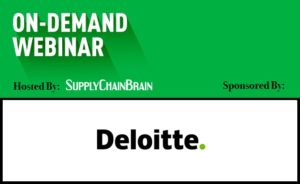ARTICLES
ON DEMAND WEBINAR
Supply Chain Enterprise Planning: Supply Chain Evolution in an Uncertain Environment
June 29, 2023
ON-DEMAND WEBINAR
Strategic Supplier Management – The Balance Between Breadth and Depth
April 24, 2023
Deloitte
Supply Chain Resiliency & Risk Management – A Top Post-Pandemic Priority
December 30, 2022
Deloitte
PART THREE: Smart Transportation: Leveraging Technology to Transform the Movement of Freight
Series: Creating Resilient Supply Chains Through IT Innovation
October 12, 2022
Subscribe to our Daily Newsletter!
Timely, incisive articles delivered directly to your inbox.
Popular Stories
-

The Mysterious Case of the Disappearing QR Code
-

Amidst Another Disappointing Peak Season, Manufacturers Increasingly Look to Data
-

Navigating to Net-Zero: Procurement's Role in Supplier Emissions
-

Automating the Cold-Chain Warehouse
-

Podcast | Will an Investment ‘Supercycle’ Spark the Revival of American Manufacturing?
Case Studies
-
JLL Finds Perfect Warehouse Location, Leading to $15M Grant for Startup
-
Robots Speed Fulfillment to Help Apparel Company Scale for Growth
-
New Revenue for Cloud-Based TMS that Embeds Orderful’s Modern EDI Platform
-
Convenience Store Client Maximizes Profit and Improves Customer Service
-
A Digitally Native Footwear Brand Finds Rapid Fulfillment







